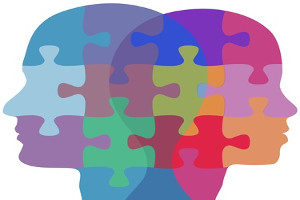 What is Mental Health?
What is Mental Health?
Why do we look after and maintain our physical health but neglect our psychological health?
We visit the doctor if we have a stomach pain, we take care of our teeth, put a plaster on our skin if we cut ourselves. Yet, if we suffer psychological difficulties such as rejection, loneliness or failure we just ignore it, or tell ourselves to snap out of it, pull ourselves together. Our physical health seems more important to us than our emotional health, yet these emotional difficulties can worsen over time and have a significant impact on our lives, if we do not address them.
Our mental health encompasses our emotional and psychological well-being and also how well we function socially. When we have positive mental health we have the ability to:
- Reach our potential
- Work creatively and productively
- Cope with the everyday stresses of daily life
- Enjoy meaningful social interactions
- Contribute fully to family and work life and also the wider community.
Statistics show that 1 in 4 of us will experience mental health problems at some point in our lives. Anxiety and depression are the most common issues and can have a debilitating effect on people’s lives. According to the ‘Mental Health Foundation’ 1 in 10 people are affected at any one time. More serious issues such as bi-polar and schizophrenia affect 1 to 2 in every 100 people.
These statistics show that undoubtedly we will all know someone who is struggling with their mental health, yet despite statistics being so high there is still stigma around mental health. Managing physical health seems to be much easier as there is generally something we can actually see. People understand it and therefore react in a more positive manner to physical illness. However, people struggling with mental health issues talk about discrimination, feeling worthless and isolated. Stigma prevents many people from seeking the help they need as they feel uncomfortable or judged. Talking about mental health, being open about it can help to break the stigma.
It is frustrating for me when clients tell me that they have seen their doctor in relation to their anxiety and are told: ‘maybe you need to accept that this is just the way it is’! This has recently happened with a client I have been working with, and not for the first time. What does this say to someone who has visited their doctor for help? This feels totally dis-empowering and makes sense of why some people feel stuck with their anxiety. They feel weighed down with the thought that ‘this is it, I am just going to have to put up with it’ and do not see the point in seeking any further help. Luckily my client decided to try counselling and a few weeks into the sessions stated that she had had a week where her anxiety was ‘zero’.
So, talking about how you feel is healthy and it does help. That isn’t to say that talking therapies are for everyone. It may be that now isn’t the right time for you, talking therapies do not feel right for you or you simply do not feel comfortable at the present time talking about your feelings. If you are unsure, it may be an idea to have an initial chat with a therapist to clarify any of your concerns.
Talking to a professional can help you:
- Understand your thoughts and how they affect you
- Make sense of past events and how they have an effect on you today
- Recognise unhelpful patterns of behaviour
- Learn how to manage anxiety and stress
- Feel empowered to make changes
- Come to terms with physical illness
- Build positive relationships
Talking can help in many different ways and it doesn’t necessarily have to be to an expert. Talking to a friend or a colleague, someone who will simply listen, can be incredibly beneficial and help you to feel that someone cares.